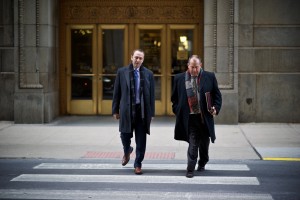Chicago Nursing Home Emotional Abuse Lawyer
 No one wants to watch their loved one suffer, especially when it is an older adult who cannot easily defend themselves. If your loved one is being emotionally or psychologically abused in their Chicago nursing home, the attorneys of Karlin, Fleisher & Falkenberg, LLC can help. Call 312-346-8620 to schedule a free discussion about your suspicions with one of our Chicago nursing home emotional abuse lawyers.
No one wants to watch their loved one suffer, especially when it is an older adult who cannot easily defend themselves. If your loved one is being emotionally or psychologically abused in their Chicago nursing home, the attorneys of Karlin, Fleisher & Falkenberg, LLC can help. Call 312-346-8620 to schedule a free discussion about your suspicions with one of our Chicago nursing home emotional abuse lawyers.
The signs of emotional abuse may not be as clear as those of physical abuse or neglect. However, the devastating effects are still there. Nursing homes, their employees, and anyone else who abuses an older adult should be held liable for their actions. If you do not know where to turn and feel like you are out of answers, the attorneys of Karlin, Fleisher & Falkenberg, LLC will gladly offer you support and an analysis of your options to rectify the situation.
Do I Need a Nursing Home Emotional Abuse Lawyer?
Maybe you are aware of the emotional or psychological abuse of an older adult in your family. Maybe you only have suspicions that something has gone wrong. Either way, an attorney will be able to assist you in having your questions answered. Whether an investigation or interviews of involved people are necessary, or a lawsuit must be filed against a nursing home or medical provider, an attorney will be prepared to take action in your case.
Dealing with any form of abuse of a loved one is difficult. Do not add to your stress and worry by trying to navigate complex legal processes on your own. By retaining an attorney, you can stay focused on maintaining your well-being and helping your loved one cope. An attorney will keep you informed every step of the way and may be able to negotiate a settlement or try your case in front of a jury to obtain the best results for you and your family.
Why Choose Karlin, Fleisher & Falkenberg, LLC to Handle My Case?
 At Karlin, Fleisher & Falkenberg, LLC, we genuinely care about the well-being of older adults who cannot fight for themselves. We strive to assist family members in helping their loved ones regain their well-being and sense of control. We will support and guide you throughout the process of determining the type of abuse that has occurred and what we can do about it.
At Karlin, Fleisher & Falkenberg, LLC, we genuinely care about the well-being of older adults who cannot fight for themselves. We strive to assist family members in helping their loved ones regain their well-being and sense of control. We will support and guide you throughout the process of determining the type of abuse that has occurred and what we can do about it.
Partner Jonathan B. Fleisher handles a number of nursing home abuse cases and has developed a successful track record of recovering verdicts for his clients. Mr. Fleisher is a member of the Million Dollar Advocates Forum and the Multi-Million Dollar Advocates Forum. He is also heavily involved in the Illinois Trial Lawyers Association as a member of the Board of Managers. Mr. Fleisher is prepared to assist you in all aspects of your case and go to trial if necessary.
Additionally, Partner Charles Falkenberg has a significant nursing home abuse and neglect practice. He has been recognized as a Leading Lawyer by the Law Bulletin Publishing Co. in the area of Nursing Home Negligence Law.
The attorneys of Karlin, Fleisher & Falkenberg, LLC are proud to provide you with an opportunity to discuss your case by calling us at 312-346-8620 or using the chat function on this website. We look forward to hearing from you and discussing how we can assist you and make the life of your loved one better.
Types of Emotional or Psychological Abuse
- Verbal Types of Emotional Abuse – As the name implies, verbal emotional abuse involves the words that are used and how they are used. Verbal emotional abuse can include the use of threats or intimidation. It can also involve humiliating the older adult. Yelling at the older adult regularly or frequently speaking to the person in a degrading or harassing way can qualify as verbal emotional abuse.
- Nonverbal Types of Emotional Abuse – Emotional abuse of an older adult may also take nonverbal forms. These can include isolating the person from social activities or preventing them from contacting others. Withholding emotional support, ignoring, and neglecting an older adult can be forms of emotional abuse. Causing an older adult to be in fear at all times or taking away their rights to privacy are also ways to nonverbally abuse an elder.
Signs of Emotional Abuse of an Older Adult
While physical abuse and neglect signs and symptoms may be more obvious than emotional or psychological signs of abuse, the harm to the victim is undeniable. It is important to be observant around older adults because a common tactic used by an abuser is to keep the victim isolated and quiet about their abuse.
If an older person reports emotional or psychological abuse, it is obviously important to follow up and assess the situation so that the victim can be placed in a better environment. When you suspect abuse or a victim denies that it is happening, be aware of the following signs and symptoms:
- Anxiety
- Depression
- Withdrawing from people and activities
- Confusion
- Becoming angry without being provoked
- Sudden changes in eating and sleeping patterns
- No communication or not willing to speak openly
- Low self-esteem
- Avoiding eye contact
Although the above symptoms should put you on the alert that emotional abuse may be taking place, these symptoms can also be signs of other problems. Even so, it is better to be safe than sorry when considering the well-being of your loved one. Contact us immediately if you think your loved one has been emotionally or psychologically abused.
Read more: Warning Signs of Nursing Home Negligence and Abuse
Compensation in an Emotional Abuse Matter
When an older adult in your life has been harmed by emotional or psychological abuse, you may be wondering what kind of compensation is available. You may be entitled to compensation for the damage to the older adult’s emotional well-being. If we can file a personal injury lawsuit in your matter when there is also physical abuse or neglect, then economic damages such as medical expenses, pain and suffering, and other losses could be covered.
In some cases, punitive damages may be available. Punitive damages are not designed to compensate the victim but rather to punish the wrongdoer. They are essentially a way in which a civil court can punish an entity or individual for actions that are truly egregious. It sends a message that abuse is not going to be tolerated. Punitive damages can also serve as a way to deter other nursing homes and caregivers from abusing other older adults. Whether punitive damages make sense in your case is very fact-specific.
What to Do If You Suspect Emotional Abuse
 When you suspect that emotional abuse is happening to an older adult, first try to speak with them privately to determine whether there is an explanation for the problem. There may be an explanation or the person may not be willing to talk. This can be a sign of abuse since perpetrators often try to keep victims silent about the activities surrounding the abuse.
When you suspect that emotional abuse is happening to an older adult, first try to speak with them privately to determine whether there is an explanation for the problem. There may be an explanation or the person may not be willing to talk. This can be a sign of abuse since perpetrators often try to keep victims silent about the activities surrounding the abuse.
After speaking with the individual, if you still believe that emotional abuse is occurring, it should be reported to the facility where your loved one lives. Several agencies, including the Illinois Long-Term Care Ombudsman Program, investigate nursing home abuse cases. Illinois Adult Protective Services also investigates allegations of elder abuse for adults aged 60 and older in the community. This agency has a hotline that can be reached at 1-866-800-1409 for confidential reporting. You should have as much detail as possible to support your suspicions of emotional or psychological abuse as possible to support your case. Contact our firm for help gathering evidence.
We can assist you in holding the parties who have mistreated your loved one or enabled it to happen liable. Since emotional abuse can lead to a physical decline in older adults, it is important to address the situation as quickly as possible. Changing the victim’s environment should be done as soon as possible. Other resources, such as counseling and therapy, can assist your loved one in recovering their well-being.
Contact one of our Chicago nursing home emotional abuse lawyers today on this website or at 312-346-8620 so your loved one does not suffer any longer.
Nursing Home Emotional Abuse FAQs
When you discover that your loved one was the victim of emotional abuse at a nursing home, one of your first thoughts is probably what you should do next. Emotional abuse of older adults can have long-lasting consequences, affecting their mental state and quality of life. We have answered clients’ most common questions to prepare you for the legal road ahead.
What are the long-term effects of emotional abuse on nursing home residents?
When someone can no longer care for themselves, they trust and depend on nurses and staff at nursing facilities to provide them with the daily assistance and medical treatment they require. When those individuals take advantage of the elderly, humiliating, yelling, and otherwise mistreating them, the impact can be significant.
The effects of emotional abuse may be immediately apparent and often result in long-term psychological conditions. At first, your loved one might exhibit signs of:
- Mood and behavioral changes
- Lack of self-esteem
- Fear
- Sadness
- Withdrawal from friends and family
Their diminished mental state could cause frequent falls and injuries. It can also lead to sudden weight loss and withdrawal from social activities. Without adequate treatment, these symptoms of emotional abuse can turn into severe issues, such as:
- Cognitive decline
- Depression
- Post-traumatic stress disorder (PTSD)
- Anxiety disorders
- Self-harm
- Substance abuse
- Suicide
Where should I take my family member for treatment for emotional abuse?
If you discover your loved one has been suffering emotional abuse, it’s crucial that you remove them from the situation immediately and seek medical treatment. Without immediate intervention, their physical health and mental state could rapidly decline. Bring them to someone they can talk to about what happened to them and learn about the available treatment options. Some specialists understand the psychological toll abuse can take on the elderly and the best way to help them overcome the damage that’s already been done.
The most common forms of treatment for emotional abuse are:
- Medication – There are prescription drugs a doctor can prescribe for anxiety or depression. Some medications can calm your loved one and help them sleep at night. Sometimes, doctor-prescribed medication is all it takes to alleviate someone’s emotional pain after a traumatic experience.
- Counseling – Your relative might benefit from seeing a psychologist or psychiatrist. Take them to someone specializing in the field of mental illness to determine the right course of treatment. Talking about their experience could alleviate some of the shame they’ve been carrying and help them cope.
- Medical treatment – Emotional abuse can cause certain medical conditions to progress, leading to new diagnoses. Self-inflicted injuries can also occur when an older adult is the victim of abuse. A doctor should evaluate them to determine if a pre-existing illness or injury has worsened and how to treat it.
Are nursing home patients more vulnerable to emotional abuse?
Yes. The fact that many older adults have illnesses, cognitive issues, and physical disabilities makes them more likely to become victims of all types of abuse. Emotional abuse is especially prevalent in nursing homes because the elderly cannot defend themselves. They might fear speaking up about what happened because they think their abuser will retaliate. Residents with dementia or Alzheimer’s can’t remember what they’ve been through, so the abuse goes unnoticed by others.
The most common risk factors for emotional abuse include:
- Lack of visitors at the facility
- Issues with mobility
- Mental illness
- Cognitive impairment
- Physical disability
Contact Us Today
If your loved one is experiencing abuse at the hands of a caregiver, it is essential that you contact us right away. We will consult with you to understand the details of your case and how we may serve you in recovering the compensation that you and the older adult in your life deserve.
Our attorneys specialize in Chicago nursing home abuse lawsuits, including those involving emotional abuse. We have a long track record of getting results in this type of case, and our past clients say we are empathetic and professional.
Contact us on this website or at 312-346-8620 to schedule a free consultation with one of our Chicago nursing home emotional abuse lawyers today.
Read more:
